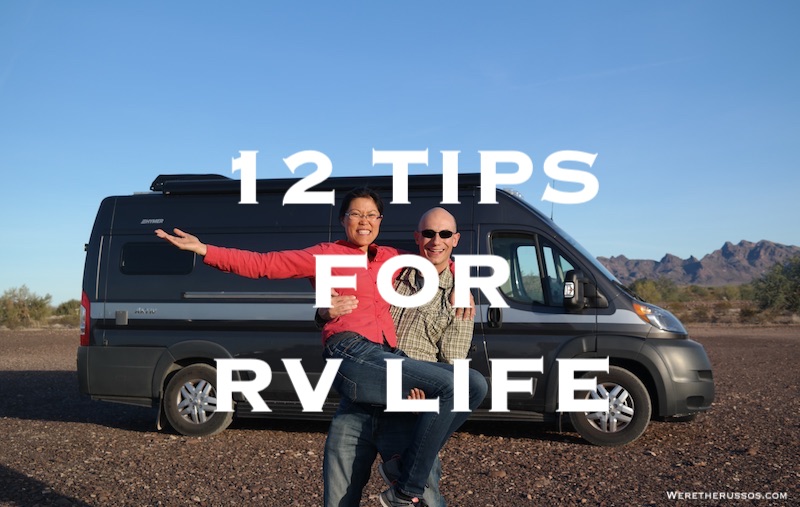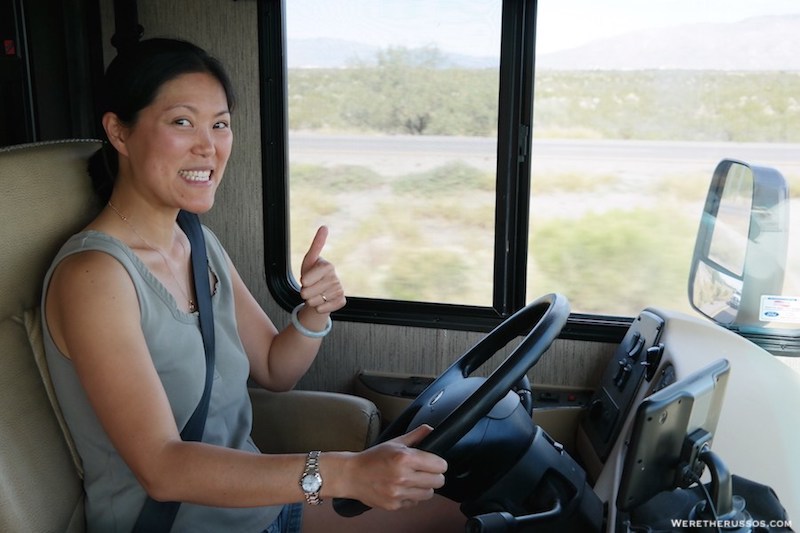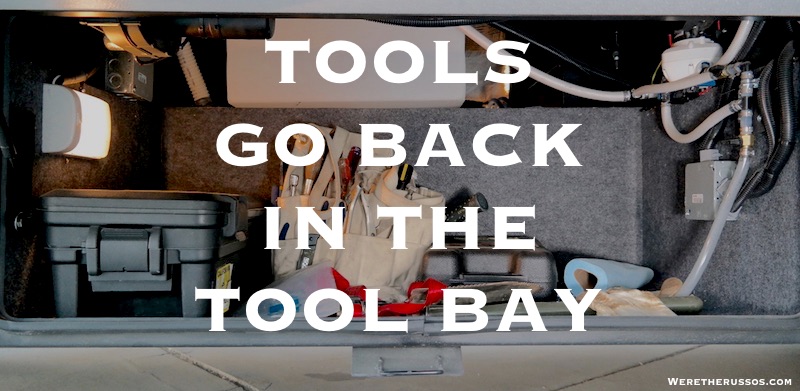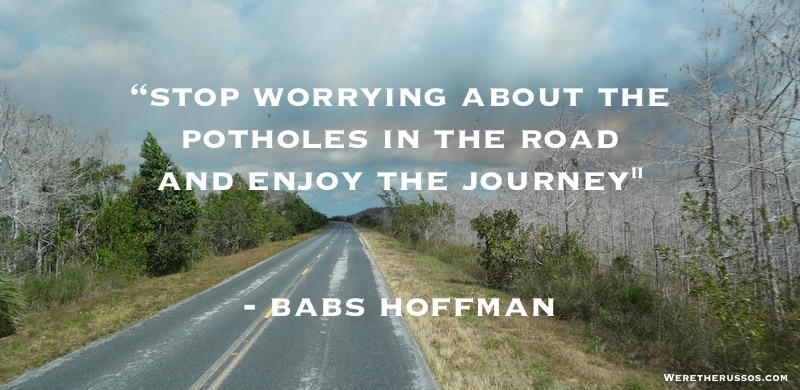Some of the links below are affiliate links, which means we will earn a commission on the products or services you purchase using the links. There is no additional cost to you and the earnings help keep this website running. Read the Affiliate Disclaimer for more information.
Living in an RV or any small space can have its challenges. Our first year of full time RV life flew by in the blink of an eye and we learned quite a bit during that time. As we celebrate six years on the road, below are some RV living tips that helped us survive the transition to the RV lifestyle. Whether you’re a solo RVer, family of five or a couple traveling with pets, I hope you find these tips helpful.

12 RV Living Tips
If you prefer video, watch our RV Living Tips video it here. Otherwise, keep on reading!
Table of Contents
1. Communicate
Good communication is as stimulating as black coffee, and just as hard to sleep after.”
– Anne Morrow Lindbergh
The key to our survival is good communication. There is limited room in an RV and it will start to feel small fast. If you’re frustrated or angry with each other, that space will feel even smaller. Sure you can take a walk, sit outside for a while or jump in the car (if you tow one) and go for a drive, but temporary distance won’t solve the issues.
A lack of communication in the first month of transitioning to RV living put stress on our relationship. Once we figured out the communication breakdown and addressed it, life was much more enjoyable. Good communication is something we continue to work on everyday especially living full time in a camper van.
If you’d like to read more about our first year on the road in an RV, check out Joe’s second book, Tales From the Open Road.
2. Have the Right Gear
Having the right gear will help prevent many headaches down the road. The best thing we did before transitioning to RV living was doing extensive research on the best gear.
For a list of our favorite gear, check out these posts or head to our store:
Best Gadgets for RV Living
Favorite Kitchen Gadgets
Dog Gadgets for RVing
Essential Apps for RVing
3. Know Your RV
Each camper we’ve owned has come with a suitcase of user manuals. There was an instruction booklet on everything from how to clean and service our RV and awning to the fire extinguisher and everything in between. There was even a manual on RV tires.
We read through every manual and downloaded the online versions as a backup. Having a PDF version will make searching for a specific topic faster and easier. There are also build sheets, diagrams for each fuse box and information on proper tire inflation. We’ve referenced all the information many times throughout our years of RVing.
When a fuse goes out at 1 a.m., you’ll want to know which fuse box to check. Our first RV had four fuse/breaker boxes and two of them were outside. When it’s pouring rain outside, it’s not fun to run around wondering which breaker box to check.
4. Spring Cleaning
It can be a challenge to figure out what to bring for full time RV living. “Is one pair of sandals enough or do I need a second pair for campground showers?” We ended up having way too much stuff. After a month of being on the road we decided to sell the bicycles because we never used them.
A few months in, we performed a spring cleaning by re-evaluating everything in the RV. Many articles of clothing ended up in the donation pile because neither of us had touched them since we moved in. “I’ve been looking for this!” The spring cleaning also reminded us of things we’d brought that we forgot about.
This is also a great time to reorganize and optimize storage in your RV. After the initial cleaning, most of our bays, cupboards and drawers ended up half empty. That’s also about the time we realized we could downsize to a smaller RV.
5. Share the Drive

Looking back on the miles we drove in the first year, neither of us can imagine doing it by ourselves. Unless you don’t have plans to move very often or for long distances at a time, it’s good to share the drive.
Whenever I pull up to a campground or RV park, the neighbors always stop by and say to Joe “I wish my wife drove.”
If you’re not comfortable driving an RV, there are driving classes available. The more you drive, the more confidence you will have. Before you know it, you’ll be thinking to yourself “this is a piece of cake”. You might even start looking forward to taking your turn behind the wheel.
6. Develop a Checklist
After too many items flying off the counter and drawers coming unlatched around a corner, we knew it was time to have a checklist. Just like pilots have a pre-flight checklist, it’s important to have a pre-departure checklist for your RV.
Every checklist will be different depending on the type of RV and the gear. The important thing is to make a comprehensive list and check it EVERY time you leave. We got complacent a few times and inevitably we would forget something.
7. Everything Has A Place

Just like the cupboards in your house, everything has a place in an RV. The difference is, when the RV is going down a bumpy road and that bottle of vinegar gets loose because it was put back in the wrong place, you might end up with a mess on your hands.
It also makes packing up a much faster process because you know where all the pieces of the puzzle go…and where they are when you unpack.
8. One In, One Out
This rule applies to anyone looking to prevent a build up of “stuff” in the RV. The “one in, one out” mentality changed the way we shopped. A trip to Costco meant we bought what we needed at the time, not what we think we might need in six months. Just because there’s storage space doesn’t mean it needs to be filled.
We do try to store at least one months worth of food in our camper at all times. For drinking water, we can use our Berkey water filter for clean without having to buy and store bottle water.
A minimalist approach to RV living worked the best for us. Once we got the hang of it, life became much more enjoyable. We no longer had an “explosion” of stuff when we camped somewhere for a week or longer. It ended up becoming a “one in, two out” policy naturally and the bonus for us was saving money.
9. Expect the Unexpected
Be ready for the unexpected. Whether it’s severe weather, a flat tire or an RV windshield repair.
Have an RV repair fund to pay for that unexpected problem.
Carry a spare in case there’s a flat tire.
Develop an emergency plan for unexpected situations.
- If you have to evacuate the RV, do you have your essentials in one place with easy access?
- What’s your plan if there’s a flash flood and the river you’re camped next to is flooding?
- What happens if there’s a medical emergency and no cell phone signal?
- Where are you going to go if the campground or area you’re camped in is being evacuated or locked down?
This video shows a glimpse of the severe thunderstorm tornado warning we experienced our first year on the road.
10. Be Flexible

Be flexible enough to have the option to stay a few extra nights or leave early. It’s good to have an idea of where to go, what to do and how long to stay but don’t have a rigid plan.
Every town we drive into is a new experience. Sometimes we love the town and sometimes it’s just not our cup of tea. Having a flexible schedule means we can stay longer in places we enjoy and take off early if we’re not feeling it.
11. Fun Fund
Have a “fun fund” for those spur of the moment adventures. If you decide that today is the day you want to go for that hot air ballon ride, do it! Having money set aside for these experiences will make that transition to RV living more enjoyable and fun.
We try to seek out free and inexpensive things to do in our travels, but there are some experiences that are worth the splurge.
Our big splurge was RV camping at Fort Wilderness and going to Walt Disney World.


We’re actually looking into getting a RV to do more biking so it will be interesting to see what we spring-clean. Thanks for all the great tips!
This content is really helpful for newbies who are thinking to live an RV life. As I am also fond of traveling so these tips will help me a lot. Thanks for giving such a piece of amazing information.
Thanks for sharing all of your RVing experience
What solar do you use is it suitcase or on top
We’ve had quite a few different solar setups. Started with this solar suitcase in the Class A RV. Had roof top mounted panels in the different Class B RVs. In the 4×4 truck camper we have roof mounted panels plus portable. Here’s a video on the basics of solar for your RV.
Thanks for explaining that we need to have the right gear to optimize RV living, including the latest gadgets. According to my knowledge, it’s a good idea for anyone who RVs full time to have a satellite installed. This is a good way to stay connected to the world in addition to staying entertained!
Hi there! My husband and I are considering this lifestyle for a while. Can you recommend 4 best camp grounds in FL one being in the South East, South West, North East, & North West parts of Florida? Also, any 2 of your favorites 1 in Southern & 1 in Northern GA? We appreciate your input on safe nice & not super expensive. Thank you!!!
Hi Gwen, Our favorite camping spot in Florida is Disney’s Fort Wilderness. You can check out our travel page to see all the campgrounds we’ve written about in Florida. A great tool to help you find campgrounds is Allstays Camp & RV.
I was so geared up to do this, I’ve wanted to do some traveling for years. Now I worry about the coronavirus and what’s going to happen with that, and maybe I’m too old at 73. I’ve been looking into selling my house, thinking about a motorhome but haven’t started looking yet, have been decluttering for quite some time and have garage full just waiting for an upcoming garage sale. I don’t know what to do really, do I continue prepping or slowly deflate and settle back down to everydayness here?? Anyway, had to get that out.
If you are healthy enough, don’t wait! You are never going to be as young as you are right now. We are in our early 70’s and enjoy the freedom of our motorhome. Too many people wait until it is too late and deprive themselves of the joy of camping. You don’t need a big camper, there are many small units that can be towed behind even a compact car that will allow you to get out there and enjoy. I suggest going to a camper show to see what is available but buy a used unit. The depreciation on a new rv is huge in the first year or two and many people get sucked in at the dealers or shows with low payment but for the rest of your life. Used equipment often comes with accessories that you will need and there are going to be some good deals in the spring as we come out of this pandemic.
I hope you went, Marie!!
Im researching rv living I’ll be reading joes book
It’s good to know that being flexible can help you survive life in an RV. My wife and I would like to explore the country in an RV. We’ll be sure to look further into our options for being flexible to help us do so.
I have a rule now for stuff, if I don’t use it for a year I probably won’t need it. Get rid of it.
Also, a good solar setup makes everything easier, especially if you like boondocking, worth investing in it.
But, the best way to survive is to find the people you like to travel with, find your tribe!
My wife is retired. I will retire in
7 years. We are thinking about selling the house and living in and RV. My question is what do you do about mail?
Hey Burke. We use Escapees which you can read more about here: How to Get Mail on the Road While Traveling
Look into a place called St. Brendan’s Isle in Green Cove Springs, FL. They have a website. They have a fantastic mail service for RVers and will even help you obtain Florida residency and drivers license. I know there is a similar service somewhere in Texas too. I’ve personally used St. Brendan’s and have been very happy with their service.
Dakota Post in South Dakota handles the mail and transfers of Registration and licenses
How is the Everest Peak from the base camp tourist center?
I’ve been following the van life for a couple of years. I won’t be selling my home, but I will be buying a van. I like the looks of the new Carado Axion Studio, but I haven’t seen it in person yet. Hope to pass you on the road in a couple of years. God Bless & Happy New Year.
Hi guys,
How do you travel in freezing weather?0
We don’t, we stay south during the winter.
Get a SAFE alternative heat source and zero degree sleeping bag! I find 10 degrees more comfortable than 100 degrees now. I’m from the south and live in New England now and love winter camping!
Thanks for the tip!
That seemed like that would have been pretty scary!
Hi Joe. I love your videos and the research you put into them.
I do have a problem with your audio levels being too low, even with my settings on high.
Do you get this comment from others? If yes, matbe a cordless mic would help.
Did you say,only 50k miles? When I was working, I recall 1 week, on night service, well what with the heat ( 93, or 94 ) but that was 1500 miles in NJ, my last car 355k miles, anyhow , if I ever go on the road it probably HYMER 1.0 but it would only. Be me.Wife can’t ever see anyone living in a vehicle, the other is my age 77, and 1.35 million miles, so I now only use a 1/2 tank per month ! 2013 Ford Taurus.
Stay well<and God Bless you !
Need a decoder ring for this post. What are you saying. Please decode.
Tip 13: shave your heads!